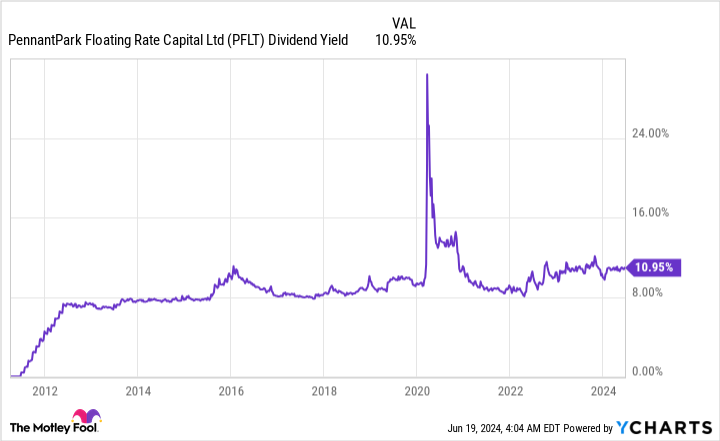
Over the long term, Wall Street has been nothing less than a wealth-creation machine. Even though the stock market has its ups and downs, stocks have easily has outperformed other asset classes over the past century, including Treasuries, real estate, oil and gold.
But not all actions are equal. While artificial intelligence (AI) stocks and the “Magnificent Seven” have received most of the credit for pushing major indexes to new highs in 2024, dividend stocks have been Wall Street’s fuel source for the past half century.

Dividend Stocks Are Wall Street’s Unsung Hero
In 2023, investment advisors at Hartford Funds released a lengthy report examining the ins and outs of what makes dividend stocks so great. In particular, “The Power of Dividends: Past, Present and Future” compared the performance of companies that pay dividends to those that do not over a 50-year period (1973-2023).
The report reveals that dividend stocks more than doubled the average annual return of non-payers (9.17% against 4.27%). Furthermore, this outperformance was achieved with stocks with a 6% dividend. less volatile than the reference index S&P500. By comparison, non-payers were found to be 18% more volatile than the widely followed S&P 500 index.
The Hartford funds’ findings shouldn’t be too shocking. Companies that are consistently profitable, have proven they can weather economic downturns, and are able to provide transparent long-term growth prospects are precisely the type of companies that investors expect to perform well. increase in long-term value.
Including exchange traded funds (ETFs), there are well over 1,000 securities that investors can choose from that offer a dividend to their shareholders/unitholders.
Although income seekers want to achieve the highest possible return with the least possible risk, finding this dynamic is not easy. In fact, studies have shown that the higher the returns (beyond 4%), the riskier the investment becomes. That’s why double-digit yield stocks can sometimes be more trouble than they’re worth.
But it’s not always the case.
A little-known, small-cap, ultra-high-yielding stock — currently yielding 11% — that distributes its payment on a monthly basis, might be the safest double-digit yield stock on the planet. Investors, say hello to the Business Development Corporation (BDC) PennantPark Capital Variable Rate (NYSE:PFLT).


Discover the safest monthly dividend stock on the planet with a yield of 11%
BDCs are companies that invest in the equity (common or preferred stock) and/or debt of “mid-sized companies.” Think of mid-market companies as micro-cap or small-cap companies that are generally unproven.
Although PennantPark held $192.8 million in various preferred and common stocks, as of the end of March 2024, the majority of its investment portfolio ($1.285 billion) was tied up in debt securities. This makes PennantPark Floating Rate Capital a debt-focused BDC.
As a shareholder of PennantPark, I am biased but not unaware of the risks faced by small-cap BDCs. For example, the company depends on a strong U.S. economy to ensure repayment of its outstanding loans. If the U.S. economy were to fall into a recession, as the historic decline in the U.S. M2 money supply suggests, this could lead to an increase in non-accruals (i.e., delinquencies) among mid-sized businesses .
But even with these visible risks, PennantPark has continually demonstrated what a solid foundation it rests on.
For starters, there are benefits to focusing on debt rather than equity. Since mid-market companies often have limited financial solutions, loans held by PennantPark can generate market-beating returns. At the end of March, the weighted average return on debt investments stood at 12.3%. For those of you keeping score at home, that’s more than double the roughly 5% yields attached to short-term Treasuries.
What really makes this supercharged small-cap income stock (which may have been given away by its name) tick is that its entire debt portfolio sports variable rates. Every time the Federal Reserve raises or lowers interest rates, it has a direct impact on the yield PennantPark generates on its outstanding loans.
Since March 2022, the country’s central bank has undertaken its most aggressive rate hike cycle in 40 years. As a result, the weighted average yield of PennantPark’s debt investments has increased by 490 basis points to 12.3% since September 30, 2021. As long as housing inflation remains stubbornly high, the Fed will be in no hurry to launch a rate easing cycle. This impasse lines the pockets of PennantPark.
Despite its relationships with unproven companies, PennantPark had only one company in non-accrual status as of March 31. This single default represents only 0.4% of the company’s overall portfolio ($1.48 billion) on a cost basis and is a testament to the excellent quality of its portfolio. verification process in place.
This is a good time to highlight that PennantPark Floating Rate Capital’s management team has also taken targeted steps to protect its capital. For example, its $1.48 billion portfolio, including stock positions, is invested in 146 companies. With an average investment of just $10.1 million, no investment is large enough to rock one’s portfolio.
Additionally, 99.98% of the company’s $1.285 billion debt portfolio is held in senior secured loans. Holders of senior secured debt are the first to benefit from repayment in the event a borrower seeks bankruptcy protection.
The final piece of the puzzle is that PennantPark is trading at 2%. below its book value. BDCs that generate stable interest income in an environment where the Fed’s monetary policy is incredibly transparent should not trade below book value.
While share price appreciation is likely to be modest at best, you’d be hard-pressed to find a safer double-digit yielding stock than PennantPark Floating Rate Capital right now.
Should you invest $1,000 in PennantPark Floating Rate Capital right now?
Before purchasing shares of PennantPark Floating Rate Capital, consider this:
THE Motley Fool Stock Advisor The analyst team has just identified what they think is the 10 best stocks for investors to buy now…and PennantPark Floating Rate Capital was not one of them. The 10 selected stocks could produce monster returns in the years to come.
Consider when Nvidia made this list on April 15, 2005…if you had invested $1,000 at the time of our recommendation, you would have $830,777!*
Equity Advisor provides investors with an easy-to-follow plan for success, including portfolio building advice, regular analyst updates, and two new stock picks each month. THE Equity Advisor the service has more than quadrupled the return of the S&P 500 since 2002*.
*Stock Advisor returns June 10, 2024
Sean Williams holds positions in PennantPark Floating Rate Capital. The Motley Fool has no position in any of the securities mentioned. The Motley Fool has a disclosure policy.
This little-known small-cap company might be the safest 11% dividend stock on the planet was originally published by The Motley Fool



